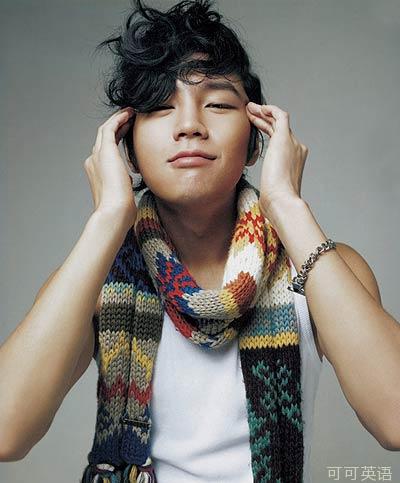
In the male-dominated society of South Korea, men who apply makeup every morning are fast becoming as commonplace as men in other places who shave every morning.
在男性占社会主导地位的韩国,男士每天早上化妆正迅速变成一件平常事,就如同其他国家的男士每天早上剃须一样。
Two years of compulsory military service and centuries of Confucian culture have imbued South Korean men with a traditional sense of masculinity. But many are beginning to embrace a new version of handsome.
由于受两年的兵役的影响和几百年来儒家文化的熏陶,韩国男士被灌输了传统的男子汉观念。然而如今很多人开始接受了对于英俊的新定义。
In the late 1990s, South Korea lifted a ban on Japanese products, including comics, which idolized beautiful men who were less masculine than tradition expected. They had softer looks with small and slender facial features. Men like them were called “flower men” and appeared in Korean dramas and movies.
上世纪九十年代末,韩国解禁了漫画等日本舶来品。日本漫画中十分推崇那些比传统男性形象更为阴柔的美男子。他们的五官小巧纤细,面容柔美。这样的男子被称为“花样美男”,在韩国影视剧中频频亮相。
Today, TV commercials in the country feature attractive male superstars with heavy makeup. The mainstream media advocate perfect skin as a necessity for finding a job and a wife.
如今在韩国,电视广告中常常出现画着浓妆的魅力男星。主流媒体也一直宣传无暇肌肤是求职和成家的必要条件。
“My skin wasn’t bad, but the media constantly sends the message that skin is one of the most important things, so I wanted to take care of it,” 27-year-old Kim John-hoon, who works in the technology industry, told AP.
27岁的金正勋在科技行业工作,他在接受美联社采访时表示:“我的皮肤不差,但媒体不断传递这样一个信息,皮肤是头等大事之一,所以我想打理一下。”
The country accounted for nearly 21 percent of global men’s cosmetics sales last year, totaling $495.5 million (3.08 billion yuan), according to Euromonitor International, a market research firm. That makes South Korea the largest market for men’s cosmetics.
据欧睿信息咨询公司的一项调查显示,去年,韩国男性化妆品市场销售额为4.955亿美元(合30.8亿人民币),约占全球男性化妆品销量的21%。韩国也因此成为全球最大的男性化妆品市场。
But many men use makeup not because they want to appear more feminine, but because they want a more crisp, clean look in order to get ahead in the country’s competitive job environment.
而许多男士之所以使用化妆品并不是为了让自己看上去女性化,而是希望拥有更干净利落的形象,以便在韩国竞争激烈的职场中拔得头筹。
Lim Jung-shik, from South Korea’s largest cosmetics company Amore Pacific, estimates that 20 percent of young men now occasionally wear some kind of foundation. But he says this doesn’t conflict with South Korea’s macho, competitive culture.
林正植供职于韩国最大的化妆品公司——爱茉莉太平洋集团。他估计现在20%的年轻男士会偶尔擦些粉底。但他也表示,这与崇尚阳刚和竞争的韩国文化并不相悖。
“In the West, if a guy wore makeup or a group of men walked into a makeup store, people might think they were gay. But here in South Korea, things are different,” he told the BBC in an interview. “A few years ago, there was an advert which said, ‘Your appearance is also your strategy,’ meaning that grooming yourself is a reflection of your competency, part of your value as a complete package.”
“在西方,如果一位男士化了妆或者一群男人走进化妆品店,人们会怀疑他们是同性恋。但在韩国却不同。”他在接受BBC采访时表示:“几年前,有个广告曾这样说:‘外表也是制胜策略’,意思是说修饰自己是自身能力的体现,同时也是整体价值的一部分。”
South Korea is a deeply competitive place with some of the longest working hours in the developed world. Competition for jobs at big-name companies is fierce. Youth unemployment is twice the national average, according to the BBC.
韩国是个竞争十分激烈的国度,也是工作时间较长的发达国家之一。据BBC报道,在韩国大公司找工作竞争十分残酷,青年失业率是全国平均水平的两倍。
In South Korea, appearances play an important role in getting jobs. All applications require photos and some employers even ask a professional face reader to join the interview process. Based on physiognomy, which assesses a person’s character from their external appearance, they ensure the company doesn’t hire unsuitable candidates, according to a recent report by ABC News.
在韩国求职,相貌起到很大的作用。所有的求职申请都必须附上照片,一些用人单位甚至会在面试过程中请来专业的面部分析师。美国广播公司最新一则报道称,根据面相学,这些公司可以从外貌来判断一个人的性格,以确保公司不会雇佣一些不合适的面试者。
“For the younger people, it’s a matter of survival,” Park Jin-won, vice president of Doosan Industrial Vehicle, told ABC News. “So when I interview future employees, I do keep in mind looks. Qualifications are basic and the real competitiveness is how you manage to be presentable.”
“对于年轻人来说,这事关生存。”韩国斗山产业车辆株式会社副社长朴金文在接受美国广播公司采访时说道:“所以当我面试未来的雇员时,我一定会把相貌铭记在心。资历是首要的,但是真正的竞争力在于你如何打造一个良好的形象。”


